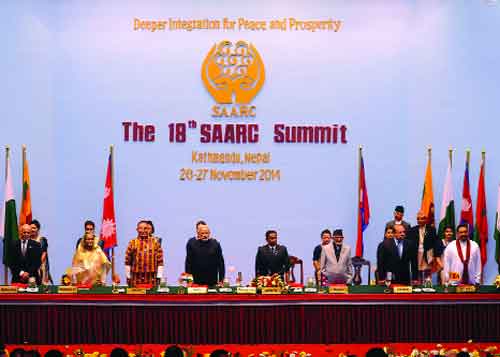The SAARC summit in Nepal that began on Wednesday (November 26) seemed heading for failure because of friction between big brother India and its arch rival Pakistan. Three agreements on rail and road connectivity as well as establishment of a regional power grid proposed by India were opposed by Pakistan at the ministerial meeting held earlier on Tuesday. In the absence of a consensus, the agreements were not signed at the summit on Wednesday. It is possible but unlikely to reach a consensus at the concluding session of the summit late on Thursday.
Reports have it that Pakistan threw a spanner when finalizing the draft agreements at the council of ministers meet. Bangladesh Foreign Minister Abul Hassan Mahmood Ali said their meeting was stretched till late night in a bid to reach consensus on at least one deal, energy cooperation (establishment of regional power grid), for signing at the Summit but failed. Opposing the agreements Pakistan explained ‘lack of internal processes being in place’. Most members took it a lame excuse. The agreements were expected to be the showpiece outcome of the Kathmandu summit blunting criticism that SAARC summits were mere talking shops.
The push of Indian Prime Minister Narendra Modi for greater interaction is among the neighbouring countries was seen by observers as an attempt to counter Beijing’s growing clout in the region. China has taken keen interest in SAARC and investments in the region. Pakistan is its old ally. China recently announced some assistance to Nepal in next four years to develop its northern districts bordering Tibet. Chinese submarines recently docked in Sri Lanka, much to the discomfort of India.
Indo-Pak bickering
Clearly the Nepal summit of SAARC was undermined by traditional bickering between Pakistan and India. The two have many differences, a predicament that has left the three-decade old South Asia Association of Regional Cooperation dysfunctional and overshadowed the group. In an obvious reference to Pakistan’s opposition to the draft agreements, Narendra Modi said there is a new awareness among the SAARC member countries for the need to quicken progress and regional integration. He warned those holding the Association back that ‘the bonds will grow, through SAARC or outside it.’
Pakistan proposed anew for upgrading the observer status of China in SAARC, seeking the role of dialogue partner or full membership to play a more influential role in the 8-member association.
The move came amid growing interest of China in the region. Some other members also want China in the forum and play the role of integration and development of the region. Australia, European Union, Iran, Japan, Mauritius, Myanmar and the USA are the others enjoying observer status in SAARC. They are not allowed to be part of deliberations and their participation is limited to attending the inaugural and concluding sessions of the summit Pakistan delegation at the meeting of council of ministers sought a stronger role for observers, particularly China, within the SAARC framework.
The proposal received support ‘in chorus’ that was quickly rebuffed by India. It was not known immediately if any other joined India in opposing the proposal. India’s spokesperson Syed Akbaruddin explained, ‘as far as we are concerned, we need to first deepen cooperation among the SAAR members before we try and move horizontally.’
Modi met all leaders but Sharif
Narendra Modi held bilateral meeting with all leaders except Pakistan’s Newaz Sharif. All these meetings were asked for and acceded to the requests, said Akbaruddin. Sharif indicated that he is ready to have a meeting with Modi on the sidelines of the summit if the Indian side takes the initiative. He put the onus on Delhi saying the cancellation of talks was Delhi’s unilateral decision and the ball is now in Indian court. ‘My vision for our region is a dispute-free south Asia where instead of fighting each other, we jointly fight poverty,’ he told newsmen on arrival in Kathmandu.
The summit held at the conference centre in Kathmandu which was built by China and donated to Nepal 27 years ago. Beijing also donated last month bullet-proof limousine cars for the leaders attending the summit and security equipments including CCTV for ensuring safety of the guests. The summit was attended by heads of government/state of India, Bangladesh, Pakistan, Sri Lanka, Nepal, Maldives, Bhutan and Afghanistan.
It is interesting to note that Xinhua, official news agency of China on Sunday distributed a newspaper that devoted several pages to promoting China’s full membership of SAARC. It quoted Nepali experts and politicians saying that it was an insult to keep restricting China to observer status in SAARC. Nepal Foreign Minister Mahendra Bahadur Pandey told newsmen that his country will have no problems if China is given the full membership. India has also preventing Bhutan establish diplomatic ties with China.
Analysts say relations between India and Pakistan would determine if SAARC moves ahead smoothly. You do not accept my proposal so I reject your proposal. This is what manifested in the approach of India and Pakistan at the summit.
Source: Weekly Holiday










